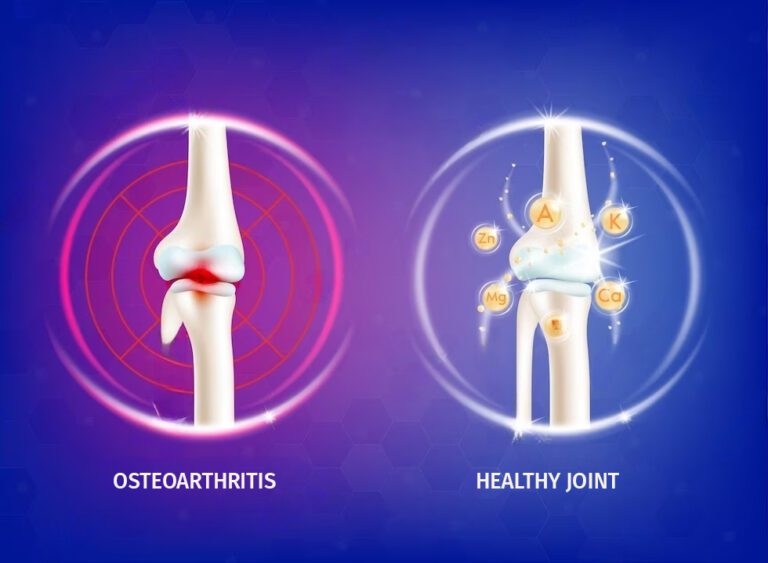
Osteoarthritis Causes
Osteoarthritis is a degenerative joint disease that affects millions of people worldwide. It typically develops slowly and worsens over time, causing chronic pain and mobility issues. Understanding the stages of osteoarthritis can help individuals to understand their disease condition, take steps to manage their symptoms, and decelerate the rate of disease progression.
What are the Causes of Osteoarthritis?
Several factors can contribute to the development of osteoarthritis, including aging, obesity, inflammation, and previous injuries. Let us look at a few of the causes:
- Obesity:
Excess weight can put additional pressure on the joints, particularly the knees and hips, leading to the degeneration of cartilage and the development of osteoarthritis. Maintaining a healthy weight through diet and exercise along with adopting a healthy lifestyle not only helps in reducing the risk of developing this condition but also helps in managing the condition.
- Swollen lymph nodes:
Swollen lymph nodes can indicate the presence of an underlying infection or inflammatory condition that can contribute to the development of osteoarthritis. It is essential to seek medical attention if swollen lymph nodes are present to determine the underlying cause.
- Joint Pain:
Joint pain and stiffness are the most common symptoms of osteoarthritis, affecting the knees, hips, hands, and spine. The pain can worsen with movement and improve with rest while stiffness lasts for some time after rest or inactivity and improves with joint movements. Together they lead to reduced mobility and function in affected joints.
Risks of Osteoarthritis
With the progression of damage to soft tissues in the joint, symptoms like pain and swelling develop, leading to compromised joint mobility. In the long run, this can lead to weakness of muscles around the joints due to lesser use, which results in additional stress over the joint. With the increase in articular cartilage damage, there will be the development of small bone growths, called osteophytes or bone spurs on the edges of the joint. Bits of bone or cartilage can also break off and float inside the joint space leading to severe pain and restricted joint mobility.

Causes of Osteoarthritis in Ayurveda Perspective
The closest available disease description for Osteoarthritis in Ayurveda is Sandhigata Vata and depending on the site of manifestation, it can be termed as Janusandhigata Vata for OA knee. General causative factors of Vatavyadhi have to be considered as etiological factors responsible for causing Sandhigata Vata. Common Hetus of Vatavyadhi, which are mentioned by Acharya Charaka are as below:
- Dietary Causes – Intake of food which is predominantly Ruksha (dry), Sheeta (cold), Alpa (less quantity), Laghu (light), and Abhojana (no food intake).
- Lifestyle Causes – Atiprajagarana (lack of sleep at night), Divasvapna (sleeping during the day), Ativyavaya (excess sexual act), Vega dharana (forcibly controlling natural urges), Plavana (swimming), Atiadhva (excess walk), Ativyayama (excess exercise).
- Psychological Causes – Atichinta (excess anxiety), Atishoka (excess grief), Atikrodha (excess anger), Atibhaya (excess fear).
Osteoarthritis Ayurvedic Treatment
While there is no cure for osteoarthritis, there is a wide range of treatment options available to manage symptoms and improve quality of life. Ayurvedic treatments such as herbal medicines used for localized external therapies, systemic treatments involving both internal and external procedures, and lifestyle modifications can help reduce inflammation, improve joint flexibility, and strengthen the surrounding affected muscles.
AvurVAID Hospitals offer a comprehensive approach to osteoarthritis management, including personalized treatment plans by experienced practitioners trained in the ancient practices of Ayurveda.
In conclusion, osteoarthritis is a common condition that can significantly impact the quality of life. Prompt attention to the factors that contribute to its development, such as obesity and inflammation, can help reduce the risk of developing this condition. AyurVAID offers a personalized and efficacious Ayurvedic approach for the effective management of symptoms and to improve the quality of life for those living with osteoarthritis.






